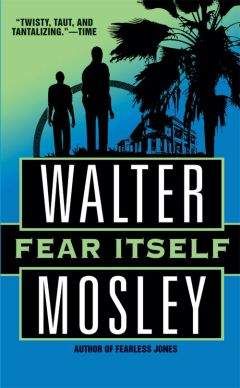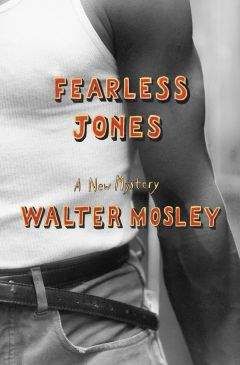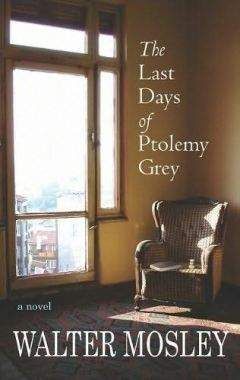Walter Mosley - The Long Fall
My words seemed to have an impact on her. Her face organized itself so that she almost saw me.
“Deep inside,” she echoed. “Yes, yes. You’re right about that. Bryant says that there are debts to be paid, but all debt comes down to blood, don’t you think?”
I didn’t know the answer to her question.
“Blood debt,” she continued, “is the curse of mankind.”
“We have to go, Mother,” Hannah said.
Mrs. Bryant’s fingers were still on the back of my hand.
“Yes,” she said, looking deeply into me. “It was so nice meeting you.”
I moved my hand and took a step back.
“Come on,” Hannah said.
Halfway up the stairs I looked back and saw that Hannah’s mother was watching us as if in a terrible rapture.
Ê€„
50
We made our way to the third floor without any more interruptions or a word spoken between us. Hannah’s natural élan seemed dampened by her mother’s beauty and peculiar ways.
We came to a black door with a small wreath of dried yellow sweetheart roses hung from it. Hannah gave me a sickly smile.
“My grandfather’s room,” she said. “He told Fritzie that a black door and yellow roses will keep any curses away.”
I nodded and we both looked at the door.
“Your mother seems distracted.”
“This is one of her good days.”
I smiled.
“You think it’–€em"s funny,” she said with no emotion that I could discern.
“My whole childhood I dreamed about living in a house like this,” I replied.
“What do you think now?”
The parrot cried out and flew over our heads just then and we both laughed.
Hannah took a step forward and knocked on the ritualistic portal.
One of the maids from the kitchen opened the door a crack and stared out nervously.
“This is Mr. McGill, Rosa. He’s here to see my grandfather.”
“I don’t know, Miss Hannah,” Rosa said with very little accent. “Your grandfather is resting.”
“Who is it?” a man’s voice bellowed from beyond the olive-and-gold-skinned woman.
“Miss Hannah,” Rosa said, turning her head back to the room.
“What she want?”
“She brought a man to see you.”
“Show him in, then, girl,” the unpleasant and very masculine voice commanded.
I became aware of recorded piano music. The composition had no style to it. It wasn’t jazz or classical or even elevator covers of pop tunes—just notes strung together in tight mathematical patterns with no heart.
Rosa stepped away, giving me the room to enter. At the same moment, Hannah took a step backward.
I looked at my young friend with the question on my face.
“I never go into Grandpa’s room,” she said.
I’ve gotten less information out of month-long investigations.
IT WAS DIM and hot in Roman Hull’s cavernous room. There was a cloying sweet smell in the humid air, accompanied by that relentless, soulless music. When the door shut behind me an irrational flash of panic pulsed in my chest. I saw no windows. The space was set up like a studio apartment cut into quarters. The area to my immediate right was a hot-plate kitchen with shelves and a small table set for one. To the left was an office with an oak desk and a plush red chair. Deeper in, there was a den or library on the left and a sleeping space on the right.
Only the makeshift bedroom was inhabited. There before the bed sat an old man in an ornate electric wheelchair. He would have been tall if he stood up. His face was cadaverous and sunken. He might have once been a white man but now he was gray with all the inferences that came with that color.
Next to him, sitting in a pine folding chair, was a small hard-eyed woman definitely from below Mexico. She wore clothes that were neither made nor sold on this continent, fruit blues and blood reds made from coarse cloth and a purple scarf that wrapped around her head and chin. Her Indian blood had not yet been conquered by the Spanish invaders, and if you had asked me what she was doing there I would have said, without hesitation, “Waiting for death.”
Golden-hued Rosa stood behind his chair.
“You here to see Bryant?” the gray man asked.
He wore bright-yellow pajamas that reminded me of the wild bird shitting in the hallway, and fat Toolie sweating in prison. There was a maroon blanket across his lap.
“No,” I said, covering the seven steps that separated us. “I came to see you.”
“What business could a Negro in a bad suit have with a man like me?” he asked. He squinted and smiled when he spoke. His teeth were gray also.
Regardless of these facial expressions, the only life left in Roman’s body was in his eyes. They were a standard brown with a feral, hateful light burning brightly from behind. If I was a superstitious man I’d have thought I was in the presence of Beelzebub’s consigliere.
“Timothy Moore,” I answered, now standing over him. “My name is Leonid McGill.”
I expected at least a little fear behind those satanic eyes. But Roman wasn’t going to crumple that easily.
“Rosa, Margarita,” he said while staring up at me, “give me and Mr. McGill a few minutes alone.”
The women moved without hesitation or complaint. Fifteen seconds after his request they were gone, leaving the menfolk behind to play their ridiculous games.
“Sit, Mr. McGill,” Roman said, gesturing toward the chair that Margarita had vacated. “That was the right word, right?”
“Sit?”
“Negro. You people still call yourselves that sometimes, don’t you?”
“I’m here about your interest in my well-being,” I said, “not terminology.”
“Oh? Educated, are you? No pullin’ the wool over your woolly eyes.”
If we were in Missouri sometime before 1980 he might have riled me some.
I smiled.
“Why did you ask Timothy to kill me?”
“I used to know a man named Timmy but not any Moore, Moor,” he said›€€div and then laughed.
“It’s not funny, Roman. It’s not funny and it takes more than bad puns to make me angry. What makes me mad is a man trying to kill me and I don’t even know why.”
The octogenarian shook his head and smiled.
“I can’t help you, Moor,” he said. “I never leave this floor.”
I understood then. Roman was dying and he knew it. His life had been limited to that room, with strangers looking after him. His own granddaughter wouldn’t come to visit him even when she lived under the same roof. My presence there represented a lifeline.
I shrugged and stood up.
“Where you going?” he asked.
I turned my back to him and took a couple of steps toward the door.
“Don’t you want to know about Timothy Moore?” he called after me.
“You don’t know anything,” I said, not turning. “It must’ve been Bryant who made the call.”
“Bryant doesn’t have the balls to kill a man,” Roman said in his strongest, most masculine voice. “I’m the one who gave him the thirty thousand to give you, and promised him a hundred more if he did the deed.”
That bought him half a turn.
“Why?” I asked.
“Come back over here and sit your nigger ass down,” was his reply.
I knew the cautionary rhyme of sticks and stones, but Roman was getting under my skin. I found myself wondering what my most excellent son Twill would have done in this situation.
Thinking of Twill brought a smile to my face. The anger dissipated and I returned to the servant’s chair.
“Why do you want me dead, Mr. Hull? I never did anything to you.”
“It was just business.”
“What business?”
“The most important kind,” he said. “Family business.”
“Do I represent a danger to someone in your family?”
He was just about to tell me; I was finally going to get an answer to the reason for the murders my investigation had made possible.
“It—” Roman managed to say before the door to the room slammed opened.
“Dad,” a man called.
Looking toward the light, I saw him coming. He wore a gray suit with a burgundy tie and hard-soled, oxblood shoes.
“Who are you?” he asked.
I stood up to meet the visitor because his demeanor was less than friendly.
He was taller than I, and white the way old paintings of American presidents are white. His hair was black and gray and his eyes tended toward brown. Behind him stood Rosa, behind her Margarita—Hannah brought up the rear. Her “never,” I supposed, became “hardly ever” when her father preceded her into her grandfather’s room.
“Leonid McGill,” I said, holding out a friendly hand. “I was just asking your father a couple of questions, Mr. Hull.”
“Get out of here,” he said, not taking up my offer of greeting.
The women behind him were silent.
“Don’t you want to know why I’m here?”
Roman was sniggering behind me. The piano music played like razor blades chipping away at my spine.
“No,” Bryant Hull said.
I looked up at him, thinking that everybody I met seemed to be taller than I.
“It might be worth your while to hear me out.”
“Leave my house or I will call the police.”
I didn’t have the time to go to jail right then, so I nodded and held my hands open at shoulder level in a sign of surrender. I was playing for time. Maybe he would ask a question in anger that would allow me the verbal foothold of a reply.
“Bryant,” a familiar voice said. “Bryant, what’s wrong? You sound angry.”
Coming into the dark and masculine room was the impossibly feminine form of Hannah’s mother. She glided up next to her husband.
They didn’t seem to fit together—he a prefabricated manikin dressed and groomed to look like a billionaire, and she the Nordic interpretation of a Mediterranean goddess.
She placed her fingers on the back of his hand.
“Hannah,” Bryant said.
“Yes, Dad?”
“Take your mother back to her room.”
“But, Bryant,” his wife said.
“Bunny, please just go with Hannah.”
Bunny.
Roman had begun a rolling, heavy cough.
Margarita went to him.
Bryant turned to me and I was feeling as if Willie Sanderson had just unloaded one of his haymakers on the back of my head.
“Are you leaving?” the rich man asked.
“Oh, yeah,” I said. “Absolutely.”
Ê€„
51
I once read a monograph, written by a man named Harlan Victorious Lowe, called Creativity and Quirks of the Mind. The author claimed, among other things, that creative thought often happens in the mind’s peripheral vision, when that metaphorical sight is jogged by obvious mainstream thinking. In other words—when one thing comes to light, the illumination often floods the dark corners with brightness.
Bunny was a blazing sun in the rabbit warren of my mind.
I jumped into a taxi two blocks from the Hull mansion and sat in the backseat, almost catatonic from the realizations as they bombarded me.
On the street in front of the Tesla Building I called Tiny the Bug.
“Yes, LT?”
“I want you to create me a website in somebody else’s name,” I said. “How many minutes will that take?”
“Five thousand dollars.”
“That’s money, not minutes.”
“Thousand dollars an hour starting twenty seconds ago.”
“Sold.”
I gave him the details. He grunted twice, asked four questions, and then disconnected the line.
ONE OF MY REALIZATIONS was that I had no choice but to give Tony the Suit A Mann’s address.
Back at my desk I placed the call.
“Yeah,” a man, not Tony, answered.
“Lucas?”
“Who’s this?”
“Leonid McGill.”
“Oh,”ž€"1e he said. The circumspection evinced by that single syllable told me that Tony was out of the loop as far as Vartan was concerned.
“What do you want?” Lucas asked softly.
“Peace in the Middle East and a brown-skinned president in the Oval Office. And, oh yeah, to talk to your boss about A Mann.”
“What man?”
Somebody asked a question in the background and Lucas, the leg-breaker, covered the mouthpiece to answer.
Various muffled sounds ensured, and then Tony was on the line.
“This job is just between us, LT,” were his first words, then, “What you got for me?”
“A man’s neck size and address.”
“Where do we meet?”
“You got my money?”
“You know I’m good for it.”
“And you know how I work, Tony. After the job is done I get paid. Job is done and you haven’t given me a dime. We haven’t even agreed on a price.”
“I thought you’d do it for a favor.”
“No.”
“You don’t want to mess with me, McGill.”
“Mess with you? I don’t even wanna talk to you. But if we do talk I expect to get paid. Fifteen thousand dollars.”
“Are you crazy?”
I broke the connection with my middle finger.
Sitting there, staring out the window at New Jersey, I wondered how many times I could get away with a move like that without getting myself killed. That brought a smile to my heart. I was alive, damn it, and that felt very, very good.
A colony of monkeys gibbered in my breast pocket.
“Yeah, Tone?”




